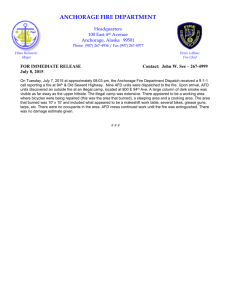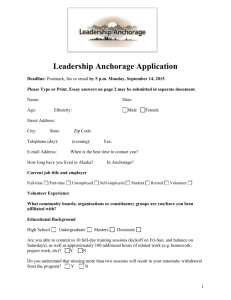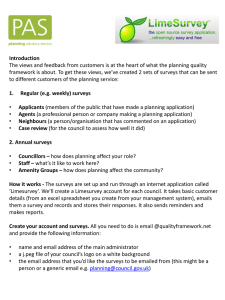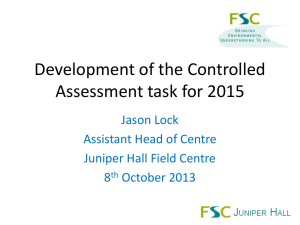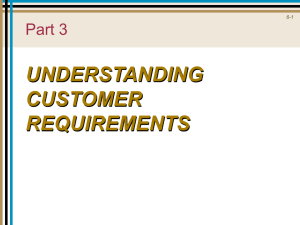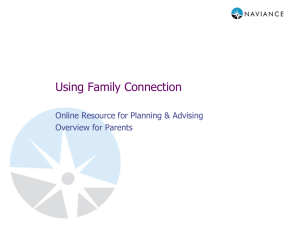Default Normal Template
advertisement
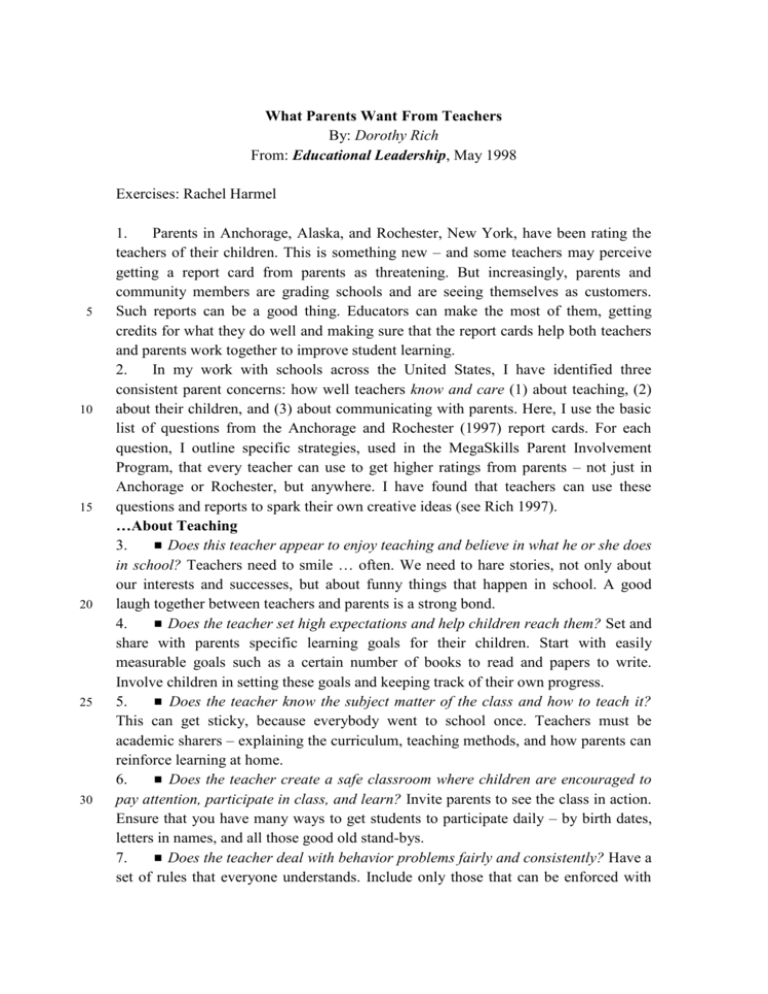
What Parents Want From Teachers By: Dorothy Rich From: Educational Leadership, May 1998 Exercises: Rachel Harmel 5 10 15 20 25 30 1. Parents in Anchorage, Alaska, and Rochester, New York, have been rating the teachers of their children. This is something new – and some teachers may perceive getting a report card from parents as threatening. But increasingly, parents and community members are grading schools and are seeing themselves as customers. Such reports can be a good thing. Educators can make the most of them, getting credits for what they do well and making sure that the report cards help both teachers and parents work together to improve student learning. 2. In my work with schools across the United States, I have identified three consistent parent concerns: how well teachers know and care (1) about teaching, (2) about their children, and (3) about communicating with parents. Here, I use the basic list of questions from the Anchorage and Rochester (1997) report cards. For each question, I outline specific strategies, used in the MegaSkills Parent Involvement Program, that every teacher can use to get higher ratings from parents – not just in Anchorage or Rochester, but anywhere. I have found that teachers can use these questions and reports to spark their own creative ideas (see Rich 1997). …About Teaching 3. Does this teacher appear to enjoy teaching and believe in what he or she does in school? Teachers need to smile … often. We need to hare stories, not only about our interests and successes, but about funny things that happen in school. A good laugh together between teachers and parents is a strong bond. 4. Does the teacher set high expectations and help children reach them? Set and share with parents specific learning goals for their children. Start with easily measurable goals such as a certain number of books to read and papers to write. Involve children in setting these goals and keeping track of their own progress. 5. Does the teacher know the subject matter of the class and how to teach it? This can get sticky, because everybody went to school once. Teachers must be academic sharers – explaining the curriculum, teaching methods, and how parents can reinforce learning at home. 6. Does the teacher create a safe classroom where children are encouraged to pay attention, participate in class, and learn? Invite parents to see the class in action. Ensure that you have many ways to get students to participate daily – by birth dates, letters in names, and all those good old stand-bys. 7. Does the teacher deal with behavior problems fairly and consistently? Have a set of rules that everyone understands. Include only those that can be enforced with What Parents Want from Teachers / 2 35 40 45 50 55 60 65 70 reliable, consistent consequences. Kids and parents should know the rules as well as you do. 8. Does the teacher assign meaningful homework? Are the assignments clear? Is enough time provided? Is homework returned in a timely manner? Before making assignments, ask yourself: “What does this really teach? Would I want to do this?” Ask children to rephrase the assignment in their own words. Share your homework schedule with parents, and check with them at conferences, through random phone calls, and through informal surveys. 9. Does the teacher make clear what my child is expected to learn? Parents, like students, need to know what is expected – and what excellent, average, and poor work looks like. Ask for their input on these expectations. Then make sure everyone knows the standards. Such publicized expectations are helpful for students trying to improve their own work – before they turn it in. …About Their Children 10. Does the teacher understand how our child learns and try to meet these needs? Teachers must remember details about all the students in the class. It helps to keep a file on every student and place little notes in the files every now and then. This specific information is priceless during phone calls or conferences. 11. Does the teacher treat my child fairly and with respect? Here again, classroom rules help ensure fairness. When we identify each child’s abilities and build on them, we show respect. When we do the same for the family, we build a bridge from the classroom into the home. 12. Does the teacher contact me promptly with any concerns about my child’s academic and behavioral performance? No parent wants to learn at the end of the year that there are problems that started mid-year. Use all means to contact parents, even hard-to-reach parents. Keep notes on when and how you made these efforts. 13. Does the teacher provide helpful information during conferences? Use those trusty files on each child for both praise and problems. When we share those problems, we need to have a solution or two ready and ask for parents’ ideas. 14. Does the teacher tell me how my child is doing in class? All parents want to hear that their children are doing wonderfully and that they are above average. While we can’t promise this, we can keep parents informed and, especially, discuss what they can do to help. Avoid that old classic, “Your child can do better,” unless you have concrete suggestions that parents can try. …About Communicating With Parents 15. Does the teacher provide clear information about class expectations? Here’s where a written set of expectations can provide information about the curriculum, goals for class achievement, standards for quality of work, and the classroom behavior code. Be brief and as specific as possible. At the fall open house, give each parent a copy and ask for questions. What Parents Want from Teachers / 3 75 80 85 90 95 100 105 110 16. Does the teacher use a variety of communication tools to report progress and student needs? Use many ways to get your points across. You may lecture, send notes, e-mail, telephone, hold conferences – and it’s still hard. At the elementary level, attach memos for parents to the school menu. In kindergarten, attach them to jackets. At the secondary level, it’s a lot harder. It’s helpful to have parents’ work numbers and addresses. 17. Is my child’s teacher accessible and responsive to me when I call or want to meet? Teachers can be accessible without being on call. Parents need to know what days and hours teachers will be available. How much easier and more efficient this will be when every teacher has a telephone in the classroom! Some teachers give out their home telephone numbers; others do not. This is a personal choice. 18. Does the teacher work with me to develop a cooperative strategy to help my child? Make sure that parents know that everything about education is cooperative – that you expect them to work with you in mutually supportive ways. This is the big message that has to get across early – and often. Moving Forward 19. The changes resulting from parent report cards in Rochester and Anchorage are yet to be determined. (The Rochester surveys, begun in early 1998, will be analyzed later this school year.) 20. The Anchorage surveys were begun two years ago. The state legislature instructed schools to find out from parents which issues were most significant to them. What evolved in Anchorage was a systematic set of surveys – for elementary, middle, and secondary schools. Each school could add additional items to the basic set of questions. 21. Fred Stofflet, Director of Curriculum and Evaluation for the Anchorage Public Schools, reports that getting people to return the surveys was difficult. Overall, there was about a 50-percent return rate, with the highest response at the elementary level. 22. What the surveys provide, he says, is the basis for ongoing discussions at each school, often about curriculum. The surveys also get at differences between what adults and children say. In the area of school safety, for example, adults and students had differing perceptions, and that, says Stofflet, helped identify an area that needed attention. 23. Stofflet says that in Anchorage, teachers initial concerns have evaporated. Even though information from the surveys was used in their evaluations, teachers came to understand that the purpose of the surveys was to find out what was on parents’ and students’ minds and to deal with issues before they become problems. 24. Surveys and activities such as these may seem insignificant, compared to other weighty issues surrounding education reform (see Langdon 1997). But reform is not somewhere “out there”. It’s in every classroom and in every home. What Parents Want from Teachers / 4 References 115 Anchorage School District. (1997). Teacher Evaluation Document, Anchorage: Alaska Board of Education. Langdon, C. (1997). “The Fourth Phi Delta Kappa Poll of Teachers’ Attitudes Towards the Public Schools.” Phi Delta Kappan 79, 3: 212-220. Rich, D. (August 6, 1997). “Seven Habits of Good Teachers Today: What This ‘Good 120 Teacher’ Didn’t Know.” Education Week 16, 41: 53, 57. Rochester Teachers Association (September 17, 1997). “Parents in N.Y. District to Critique Teachers”, Education Week 17, 3: 3. What Parents Want from Teachers / 5 125 130
